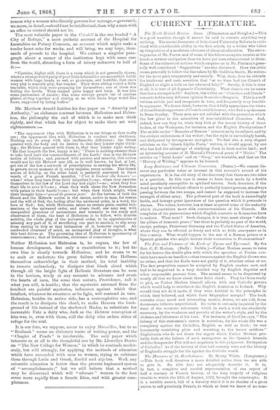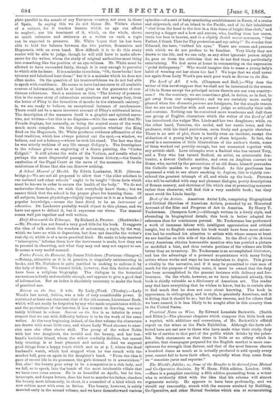The Massacre of St. Bartholomew. By Henry White. (Longmans.) —This
book well deserves a more detailed notice than wo are able to give it. Its title does not adequately describe it. It is, in fact, a complete and careful representation of one aspect of half a century of French history, of the long tragedy of religious trouble to which tho 24th of August, 1572, brought the catastrophe. It is a terrible record, full of a ferocity which it is no slander of a great nation to call peculiarly French, to which at least we know of no com- plate parallel in the annals of any European country, not even in those of Spain. In saying this we do not blame Mr. White's choice of a subject, for it teaches lessons which no age can afford to neglect ; nor his treatment of it, which, on the whole, shows as much calmness and reticence as a writer on such a topic can be expected to preserve. Mr. White hopes that he has been able to hold the balance between the two parties, Romanists and Huguenots, with an even hand. How difficult it is to do this every reader will be able to judge, though he will still have to make allow- ances for the writer, whom the study of original authorities must bring into something like the position of an eye-witness. Mr. White must be allowed to have succeeded fairly, though it is easy enough to perceive to which side he leans. It is a mistake to exclaim, "Oh, these books ! how tyranny and falsehood hate them !" but it is a mistake which he does not often make. On the question of his trustworthiness we do not feel able to speak with confidence. He seems to have had recourse to all available sources of information, and he at least gives us the guarantee of con- tinuous references. Such a sentence as this, " The history of persecu- tion is the same story of calumnious accusations and savage fury, from the letter of Pliny to the invectives of monks in the sixteenth century," is, we are ready to believe, an exceptional instance of carelessness. There could not be a more incorrect account of Pliny's celebrated letter. The description of the massacre itself is a graphic and spirited narra- tive, not written—but this is no dispraise—with the same skill that Mr. Fronde displays, but naturally, as being the central scene of the work, much more complete. On the disputed question whether the King fired on the Huguenots, Mr. White produces evidence affirmative of the local tradition, which has always pointed out the spot,—a window, we believe, and not a balcony—where he took his stand. The fact was that he was utterly reckless of any life except Coligny's. The frontispiece to the volume gives an engraving of a fresco painting, the "Caseles Colignii." It still adorns the walla of the Vatican, and recalls what is perhaps the most disgraceful passage in human history,—the frantic exultation of the Papal Court at the news of the massacre. It is the misfortune of Rome that she can disavow nothing.



































 Previous page
Previous page